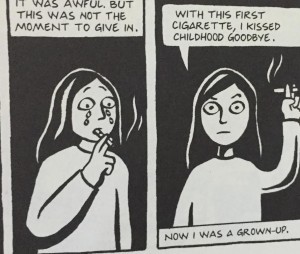Hello Readers!
This week in my ASTU Class we read “Persepolis-The Story of A Childhood”. Through her unique graphic memoir “Persepolis”, Marjane Satrapi tells us the story of her childhood during which she witnessed the overthrown of Shah’s rule, the Islamic Revolution and the war between Iran and Iraq. This light hearted yet touching story revolves around the day to day life of people of Iran during the war and Islamic Revolution and is an eye opener for the people to realise that war and political repression only cause loss of life, peace and humanity.
The tagline of Persepolis, ‘the story of a childhood’ itself gives the readers an idea of the book being a story about a child’s life and is written from a child’s perspective but I disagree with the tagline which is clearly highlighted on the cover page of the book. Satrapi talks about her life as a child which involves her peers of the same age or little elder to her but when I read the book, I thought if these children really had a ‘childhood’. In fact, after reading the book I believe the childhood of the children that time was snatched by the circumstances created by the war and the Islamic Revolution. The violence, rage, inhumanity, drastic changes and loss of the loved ones these children encountered at such a young age pre-matured them and crushed their childhood. While reading the book, one evident thing to notice was Marji’s behaviour during certain events which was anything but childlike. I am not denying the fact that this book written from a child’s perspective has an element of ‘innocence’ of a child but I cannot ignore the fact that during many events that were mentioned in this memoir, Marji’s approach towards many situation was adult like. The company of her friends who were older than her made her indulge in activities like skipping classes, lying to her mother, answering back to her mother which were inappropriate for her age. To feel like a rebellion, she smoked her first cigarette at the age of twelve and believed to have kissed her childhood goodbye as she mentions “With this first cigarette, I kissed my childhood goodbye. Now I am a grown-up”.

During the war it was not only Marji who lost her childhood but also the other children who grew up in the same circumstances. These children did not get the pleasure of having a ‘normal’ childhood which is supposed to be blooming and happy. The beauty of childhood is being carefree, innocent and unaware about the bitterness and realities of life but these children were far away from being that as they encountered the hard struggles of life at a very early age. ‘Persepolis’ for me is the story of the ‘lost’ childhood caught in the web of struggles, torture, loss and pain.
-Priya Adhikari
